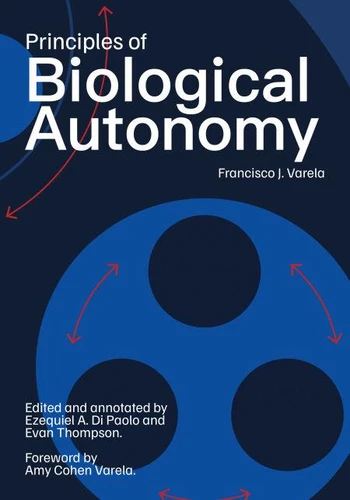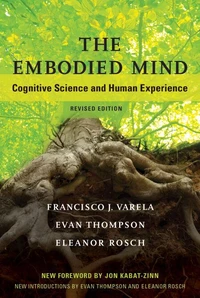Principles of Biological Autonomy, a new annotated edition
Par : , , ,Formats :
Disponible dans votre compte client Decitre ou Furet du Nord dès validation de votre commande. Le format ePub protégé est :
- Compatible avec une lecture sur My Vivlio (smartphone, tablette, ordinateur)
- Compatible avec une lecture sur liseuses Vivlio
- Pour les liseuses autres que Vivlio, vous devez utiliser le logiciel Adobe Digital Edition. Non compatible avec la lecture sur les liseuses Kindle, Remarkable et Sony
- Non compatible avec un achat hors France métropolitaine
 , qui est-ce ?
, qui est-ce ?Notre partenaire de plateforme de lecture numérique où vous retrouverez l'ensemble de vos ebooks gratuitement
Pour en savoir plus sur nos ebooks, consultez notre aide en ligne ici
- Nombre de pages408
- FormatePub
- ISBN978-0-262-38182-6
- EAN9780262381826
- Date de parution13/05/2025
- Protection num.Adobe DRM
- Taille6 Mo
- Infos supplémentairesepub
- ÉditeurThe MIT Press
Résumé
A new, updated edition of the 1979 classic from one of the foremost authors in cognitive science and theoretical biology, with the original text as well as more than 200 citations to current scientific developments. Francisco Varela's Principles of Biological Autonomy was a groundbreaking text when it was first published in 1979, putting forth a novel theory of how living systems produce and maintain themselves.
This new edition, edited and annotated by cognitive scientists Ezequiel Di Paolo and Evan Thompson-revised and complemented with introductory essays for each part of the book-contains a wealth of ideas relevant to current projects in theoretical biology, cognitive science, systems theory, philosophy of mind, and philosophy of biology. Over 220 margin annotations supplement the reading of the text, linking to subsequent research and broader contemporary debates.
This foundational book introduces the key concept of autonomy derived as an elaboration of the idea of autopoiesis (the self-production and self-distinction) of living organisms. Varela covers topics in systems theory, neuroscience, theories of perception, and immune networks and offers a participatory epistemology that goes on to be further developed in later enactive literature. These ideas are compelling not only for historical reasons but also because they still illuminate current efforts in developing the enactive approach toward wider and more challenging goals (including language, human cognition, ethics, and environmentalism).
This new edition, edited and annotated by cognitive scientists Ezequiel Di Paolo and Evan Thompson-revised and complemented with introductory essays for each part of the book-contains a wealth of ideas relevant to current projects in theoretical biology, cognitive science, systems theory, philosophy of mind, and philosophy of biology. Over 220 margin annotations supplement the reading of the text, linking to subsequent research and broader contemporary debates.
This foundational book introduces the key concept of autonomy derived as an elaboration of the idea of autopoiesis (the self-production and self-distinction) of living organisms. Varela covers topics in systems theory, neuroscience, theories of perception, and immune networks and offers a participatory epistemology that goes on to be further developed in later enactive literature. These ideas are compelling not only for historical reasons but also because they still illuminate current efforts in developing the enactive approach toward wider and more challenging goals (including language, human cognition, ethics, and environmentalism).
A new, updated edition of the 1979 classic from one of the foremost authors in cognitive science and theoretical biology, with the original text as well as more than 200 citations to current scientific developments. Francisco Varela's Principles of Biological Autonomy was a groundbreaking text when it was first published in 1979, putting forth a novel theory of how living systems produce and maintain themselves.
This new edition, edited and annotated by cognitive scientists Ezequiel Di Paolo and Evan Thompson-revised and complemented with introductory essays for each part of the book-contains a wealth of ideas relevant to current projects in theoretical biology, cognitive science, systems theory, philosophy of mind, and philosophy of biology. Over 220 margin annotations supplement the reading of the text, linking to subsequent research and broader contemporary debates.
This foundational book introduces the key concept of autonomy derived as an elaboration of the idea of autopoiesis (the self-production and self-distinction) of living organisms. Varela covers topics in systems theory, neuroscience, theories of perception, and immune networks and offers a participatory epistemology that goes on to be further developed in later enactive literature. These ideas are compelling not only for historical reasons but also because they still illuminate current efforts in developing the enactive approach toward wider and more challenging goals (including language, human cognition, ethics, and environmentalism).
This new edition, edited and annotated by cognitive scientists Ezequiel Di Paolo and Evan Thompson-revised and complemented with introductory essays for each part of the book-contains a wealth of ideas relevant to current projects in theoretical biology, cognitive science, systems theory, philosophy of mind, and philosophy of biology. Over 220 margin annotations supplement the reading of the text, linking to subsequent research and broader contemporary debates.
This foundational book introduces the key concept of autonomy derived as an elaboration of the idea of autopoiesis (the self-production and self-distinction) of living organisms. Varela covers topics in systems theory, neuroscience, theories of perception, and immune networks and offers a participatory epistemology that goes on to be further developed in later enactive literature. These ideas are compelling not only for historical reasons but also because they still illuminate current efforts in developing the enactive approach toward wider and more challenging goals (including language, human cognition, ethics, and environmentalism).





